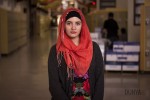The Toledo Blade recently covered the election of a woman, Salmenna Sediqe, as president of a local mosque:
Salmenna Sediqe, a businesswoman and mother of five, was elected last month and will serve a one-year term as president of the mosque on Alexis Road in Sylvania. The administrative position is separate from the mosque’s religious leadership.
What’s refreshing about this article is that, although the gender of the newly elected leader is what made this a news item to begin with, it doesn’t really harp on this issue as something really rare or extraordinary. It’s easy to imagine this as something that could easily be turned into a story about how “wow, those Muslims are finally coming out of the dark ages!” or “OMG, a female leader, the conservatives are probably writing their death threats as we speak!”
Instead of getting sensationalist and melodramatic, the journalist quotes several Muslim representatives, all of whom confirm that female leadership is not unheard of, and that, while it can definitely be celebrated, this is “not a landmark election for Muslims.” In other words, instead of the “wow, look at this woman break the stereotypes!” hype that comes up so often, the article seems to actually reflect on whether those stereotypes were even warranted in the first place, and to allow Muslims to speak for themselves about the significance of this election. Take the following quotes, for example:
Ms. Kadri said Mrs. Sediqe’s gender “should be a nonissue. As long as she was the best qualified person, that’s all that should matter. People should be judged by their merits and abilities.”
Julia Shearson, executive director of the Cleveland chapter of the Council on American-Islamic Relations, said, “We’re very pleased, of course, and I think it’s important that competent women are advanced in our community. But I don’t think it’s an anomaly.
“There have been four women presidents or prime ministers of Muslim-majority nations, and we have yet to have a woman president in the United States.”
Dr. S. Zaheer Hasan, a member of both the Masjid Saad and the Islamic Center of Greater Toledo, said Mrs. Sediqe “has the respect of the community as a very hard-working and pious lady. People who voted for her saw that in her. It was not a gender issue.”
Of course, the low level of female leadership to date is an issue among Muslim communities (although, as Shearson points out, it’s not something unique to Muslims). I would have been interested to see someone articulate this as an example of equitable hiring practices: yes, they should hire her because of her gender (alongside her obvious qualifications for the position) because the under-representation of women is a problem.
However, it’s good to see this talked about as something that’s good news but not earth-shattering, and, by extension, as an example of change developing organically from within Muslim communities, rather than as a result of outside intervention.
The article ends with a quote from Sediqe about the need for Muslims to become more involved in the greater community:
“Islam is about balance; it’s not healthy to shelter our children from other faith groups and our community,” she said. “I truly believe the way we interact and have interfaith dialogue in Toledo can be an example for the rest of the world.”
Overall, this was a very responsible and respectful portrait, both of the individual Muslim woman being profiled, and of the Muslim community that she has been elected to lead.


